最新小学英语五种基本句型
小学英语常用万能句型汇总(共62个)(找到规律英语就很好学)
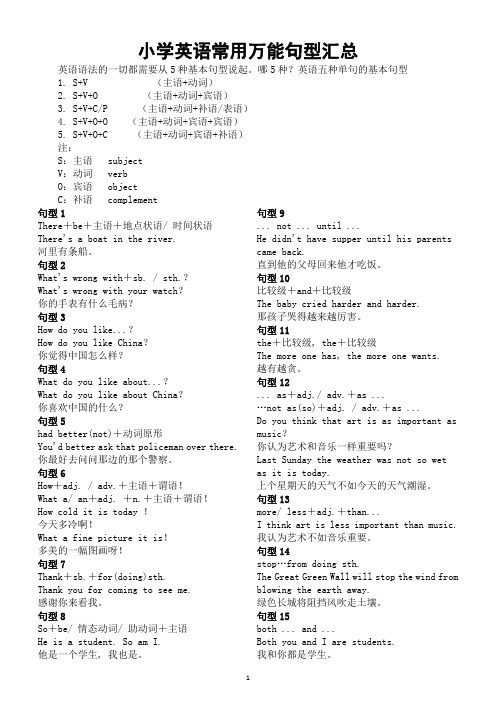
小学英语常用万能句型汇总英语语法的一切都需要从5种基本句型说起。
哪5种?英语五种单句的基本句型1. S+V (主语+动词)2. S+V+O (主语+动词+宾语)3. S+V+C/P (主语+动词+补语/表语)4. S+V+O+O (主语+动词+宾语+宾语)5. S+V+O+C (主语+动词+宾语+补语)注:S:主语 subjectV:动词 verbO:宾语 objectC:补语 complement句型1There+be+主语+地点状语/ 时间状语There's a boat in the river.河里有条船。
句型2What's wrong with+sb. / sth.?What's wrong with your watch?你的手表有什么毛病?句型3How do you like...?How do you like China?你觉得中国怎么样?句型4What do you like about...?What do you like about China?你喜欢中国的什么?句型5had better(not)+动词原形You'd better ask that policeman over there. 你最好去问问那边的那个警察。
句型6How+adj. / adv.+主语+谓语!What a/ an+adj. +n.+主语+谓语!How cold it is today !今天多冷啊!What a fine picture it is!多美的一幅图画呀!句型7Thank+sb.+for(doing)sth.Thank you for coming to see me.感谢你来看我。
句型8So+be/ 情态动词/ 助动词+主语He is a student. So am I.他是一个学生, 我也是。
句型9... not ... until ...He didn't have supper until his parents came back.直到他的父母回来他才吃饭。
小学英语常用的62个英语句型,必备

句型1:There+be +主语+地点状语/ 时间状语There’s a boat in the river.河里有条船。
句型2:What’s wrong with+sb. / sth. ?What’s wrong with your watch?你的手表有什么毛病?句型3:How do you like...?How do you like China?你觉得中国怎么样?句型4:What do you like about...?What do you like about China?你喜欢中国的什么?句型5:had better(not)+动词原形You’d better ask that policeman over there.你最好去问问那边的那个警察。
句型6:How+adj. / adv. +主语+谓语!What a/ an+adj. +n. +主语+谓语!How cold it is today !今天多冷啊!What a fine picture it is!多美的一幅图画呀!句型7:Thank+sb. +for(doing)sth.Thank you for coming to see me.感谢你来看我。
句型8:So+be/ 情态动词/ 助动词+主语He is a student. So am I.他是一个学生,我也是。
句型9:... not ... until ...He didn’t have supper until his parents came back.直到他的父母回来他才吃饭。
句型10:比较级+and+比较级The baby cried harder and harder.那孩子哭得越来越厉害。
句型11:the +比较级,the +比较级The more one has,the more one wants.越有越贪。
句型12:... as +adj./ adv.+as ...…not as(so) +adj. / adv. +as ...Do you think that art is as important as music?你认为艺术和音乐一样重要吗?Last Sunday the weather was not so wet as it is today.上个星期天的天气不如今天的天气潮湿。
小学英语四种基本句型-肯定句、否定句、一般疑问句与特殊疑问句
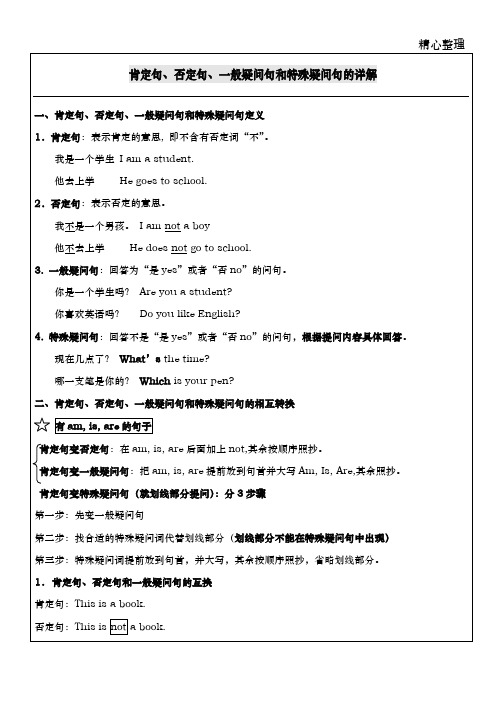
精心整理
一般疑问句:Is this a book? 肯定回答:Yes, it is. 否定回答:No, it isn’t. 2. 就划线部分提问(变特殊疑问句) This is a book. 第一步:变一般疑问句 Is this a book? 第二步:找合适的特殊疑问词 Is this what ? 第三步:特殊疑问词提前放到句首,并大写,其余按顺序照抄,省略划线部分。What is this?
肯定句、否定句、一般疑问句和特殊疑问句的详解
精心整理
一、肯定句、否定句、一般疑问句和特殊疑问句定义 1.肯定句:表示肯定的意思, 即不含有否定词“不”。
我是一个学生 I am a student. 他去上学 He goes to school. 2.否定句:表示否定的意思。 我不是一个男孩。 I am not a boy 他不去上学 He does not go to school. 3. 一般疑问句:回答为“是 yes”或者“否 no”的问句。 你是一个学生吗? Are you a student? 你喜欢英语吗? Do you like English? 4. 特殊疑问句:回答不是“是 yes”或者“否 no”的问句,根据提问内容具体回答。 现在几点了? What’s the time? 哪一支笔是你的? Which is your pen? 二、肯定句、否定句、一般疑问句和特殊疑问句的相互转换 有 am, is, are 的句子 肯定句变否定句:在 am, is, are 后面加上 not,其余按顺序照抄。 肯定句变一般疑问句:把 am, is, are 提前放到句首并大写 Am, Is, Are,其余照抄。 肯定句变特殊疑问句(就划线部分提问):分 3 步骤 第一步:先变一般疑问句 第二步:找合适的特殊疑问词代替划线部分(划线部分不能在特殊疑问句中出现) 第三步:特殊疑问词提前放到句首,并大写,其余按顺序照抄,省略划线部分。 1. 肯定句、否定句和一般疑问句的互换 肯定句:This is a book. 否定句:This is not a book.
整理小学英语四种基本句型-肯定句否定句一般疑问句与特殊疑问句

英语五种基本句型20 年月日A4打印/ 可编辑英语五种基本句型句子是由主语、谓语动词、表语、宾语、宾语补足语等组成的。
英语句子有长有短,有简有繁,似乎千变万化,难以捉摸,但其实只有五种基本句型。
所有英语句子都可以看成是这五种基本句型的扩大、组合、省略或倒装。
因此掌握这五大句型,是掌握其他各种英语句子结构的基础。
英语句子依其组合方式可分为以下五种基本句型,句子成分的表示法为:S:Subject(主语), V:Verb(动词),O:Object(宾语), IO : Indirect Object (间接宾语), DO: Direct Object (直接宾语) , P:Predicative(表语), OC:Object Complement(宾语补足语)。
五种基本句型见下表(S=主,V=谓,O=宾,P=表,IO=间宾,DO=直宾,OC=宾补):种类句型例句第1种S+V We work. (不及物)第2种S+V+O He plays (及物) the piano.第3种S+V+P We are(系动词) students.第4种S+V+IO+DO She gave(及物) me a pen.第5种S+V+O+OC He made(及物) the boy laugh.1.第1种句型:S+V(主语+不及物动词)此句型的句子有一个共同特点,即句子的谓语动词都能表达完整的意思。
这类动词叫做不及物动词,后面可以跟副词、介词短语、状语从句等。
1.主语+谓语(不及物动词)The sun was shining.The moon rose.The universe remains.We all breathe, eat, and drink.What he said does not matter.2.主语+谓语(不及物动词)+状语Lucy and Mary get up early every morning.His parents have worked in the factory for more than ten years.They had talked for half an hour when I came in.3.第2种句型:S+V+O(主语+及物动词+宾语)此句型句子的共同特点是:谓语动词都具有实义,都是主语产生的动作,但不能表达完整的意思,必须跟有一个宾语,即动作的承受者,才能使意思完整。
小学英语四种基本句型-肯定句、否定句、一般疑问句和特殊疑问句详解

肯定句、否定句、一般疑问句和特殊疑问句的详解一、肯定句、否定句、一般疑问句和特殊疑问句定义1.肯定句:表示肯定的意思, 即不含有否定词“不”。
我是一个学生I am a student.他去上学He goes to school.2.否定句:表示否定的意思。
我不是一个男孩。
I am not a boy他不去上学He does not go to school.3. 一般疑问句:回答为“是yes”或者“否no”的问句。
你是一个学生吗?Are you a student?你喜欢英语吗?Do you like English?4. 特殊疑问句:回答不是“是yes”或者“否no”的问句,根据提问内容具体回答。
现在几点了?What’s the time?哪一支笔是你的?Which is your pen?二、肯定句、否定句、一般疑问句和特殊疑问句的相互转换有am, is, are的句子肯定句变否定句:在am, is, are后面加上not,其余按顺序照抄。
肯定句变一般疑问句:把am, is, are提前放到句首并大写Am, Is, Are,其余照抄。
肯定句变特殊疑问句(就划线部分提问):分3步骤第一步:先变一般疑问句第二步:找合适的特殊疑问词代替划线部分(划线部分不能在特殊疑问句中出现)第三步:特殊疑问词提前放到句首,并大写,其余按顺序照抄,省略划线部分。
1.肯定句、否定句和一般疑问句的互换肯定句:This is a book.否定句:This is not a book.一般疑问句:Is this a book?肯定回答:Yes, it is.否定回答:No, it isn’t.2.就划线部分提问(变特殊疑问句)This is a book.第一步:变一般疑问句Is this a book?第二步:找合适的特殊疑问词Is this what ?第三步:特殊疑问词提前放到句首,并大写,其余按顺序照抄,省略划线部分。
(完整版)小学英语必备重点句型大全
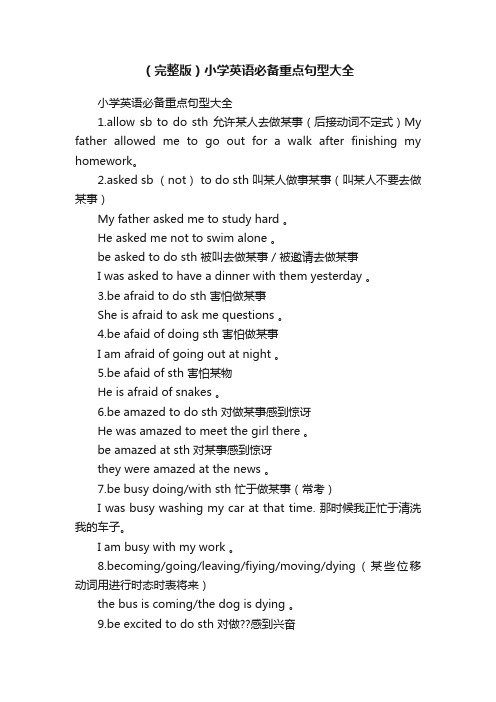
(完整版)小学英语必备重点句型大全小学英语必备重点句型大全1.allow sb to do sth 允许某人去做某事(后接动词不定式)My father allowed me to go out for a walk after finishing my homework。
2.asked sb (not) to do sth 叫某人做事某事(叫某人不要去做某事)My father asked me to study hard 。
He asked me not to swim alone 。
be asked to do sth 被叫去做某事 / 被邀请去做某事I was asked to have a dinner with them yesterday 。
3.be afraid to do sth 害怕做某事She is afraid to ask me questions 。
4.be afaid of doing sth 害怕做某事I am afraid of going out at night 。
5.be afaid of sth 害怕某物He is afraid of snakes 。
6.be amazed to do sth 对做某事感到惊讶He was amazed to meet the girl there 。
be amazed at sth 对某事感到惊讶they were amazed at the news 。
7.be busy doing/with sth 忙于做某事(常考)I was busy washing my car at that time. 那时候我正忙于清洗我的车子。
I am busy with my work 。
8.becoming/going/leaving/fiying/moving/dying(某些位移动词用进行时态时表将来)the bus is coming/the dog is dying 。
小学英语基本句型汇总
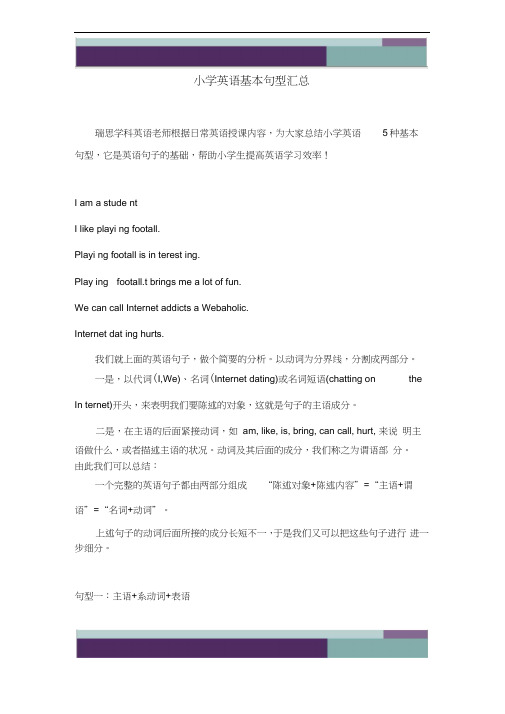
小学英语基本句型汇总瑞思学科英语老师根据日常英语授课内容,为大家总结小学英语5种基本句型,它是英语句子的基础,帮助小学生提高英语学习效率!I am a stude ntI like playi ng footall.Playi ng footall is in terest ing.Play ing footall.t brings me a lot of fun.We can call Internet addicts a Webaholic.Internet dat ing hurts.我们就上面的英语句子,做个简要的分析。
以动词为分界线,分割成两部分。
一是,以代词(I,We)、名词(Internet dating)或名词短语(chatting on the In ternet)开头,来表明我们要陈述的对象,这就是句子的主语成分。
二是,在主语的后面紧接动词,如am, like, is, bring, can call, hurt, 来说明主语做什么,或者描述主语的状况。
动词及其后面的成分,我们称之为谓语部分。
由此我们可以总结:一个完整的英语句子都由两部分组成“陈述对象+陈述内容”=“主语+谓语”=“名词+动词”。
上述句子的动词后面所接的成分长短不一,于是我们又可以把这些句子进行进一步细分。
句型一:主语+系动词+表语I am a Webahoblic.Chatting on the Internet is interesting.这个句型的谓语动词是系动词(linking verb)。
所谓系动词,顾名思义,这种动词并不表示具体的动作,而只是起连接主语和后面成分的作用。
系动词后面所接的成分,是用来说明主语的特点,表明主语的性质特征的,所以我们称之为主语补足语,或者表语(能够表示主语特征的成分)。
The music sounds ni ce.He became a teacher.The leaf will turn yellow in autu mn.英语中最常见的系动词是be动词,其具体形式有:am(I am), is(he is, she is, it is), are(we are, you are, they are). 其他的系动词还有:look, sound, smell, taste, fell, seem, appear, become, tur n.用作表语的词,通常是名词(如a Webahoblic, a teacher...)和形容词(如interesting,nice, yellow...) 。
小学英语中的基本句型与语法结构

小学英语中的基本句型与语法结构小学英语中的基本句型与语法结构英语是小学学生必修的一门课程,掌握基本句型和语法结构是建立英语语言能力的基础。
本文将介绍小学英语中常见的基本句型和语法结构。
一. 简单句型1. 主语 + 动词例如:I eat an apple.(我吃一个苹果。
)2. 主语 + 动词 + 宾语例如:She reads a book.(她读一本书。
)3. 主语 + 动词 + 地点例如:They play football in the park.(他们在公园踢足球。
)4. 主语 + 动词 + 时间例如:He goes to school every morning.(他每天早上去学校。
)二. 疑问句1. 助动词 + 主语 + 动词例如:Do you like ice cream?(你喜欢冰淇淋吗?)2. 疑问词 + 助动词 + 主语 + 动词例如:What do you do on weekends?(你周末做什么?)3. 特殊疑问句(疑问词 + 助动词 + 主语 + 动词)例如:Where did you go last summer?(你去哪里过去暑假?)三. 否定句1. 主语 + 助动词 + not + 动词例如:He does not like carrots.(他不喜欢胡萝卜。
)2. 主语 + do/does not + 动词例如:I do not play tennis.(我不打网球。
)四. 复合句1. 主从句主从句结构由一个主句和一个或多个从句组成。
从句可以是名词从句、形容词从句或副词从句。
例如:I know that she is a teacher.(我知道她是一名老师。
)I like the book which is on the table.(我喜欢桌上的那本书。
)2. 并列句并列句由两个或多个主句组成,它们之间用逗号或连词连接。
例如:I like apples, but my sister likes oranges.(我喜欢苹果,但是我妹妹喜欢橙子。
(完整版)英语五种基本句型及练习
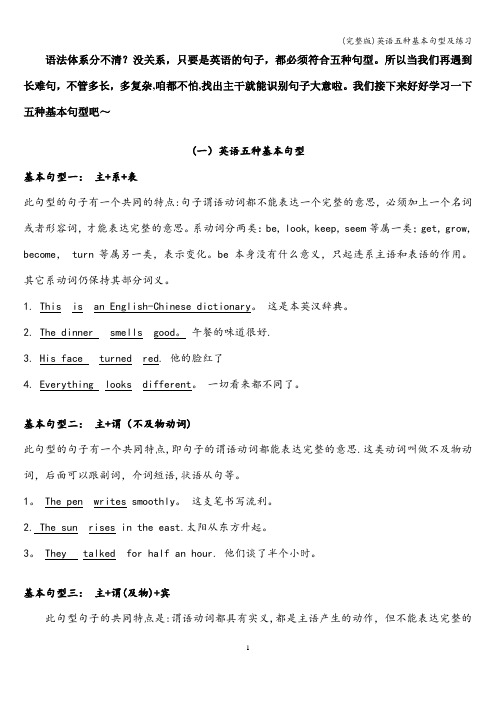
语法体系分不清?没关系,只要是英语的句子,都必须符合五种句型。
所以当我们再遇到长难句,不管多长,多复杂,咱都不怕,找出主干就能识别句子大意啦。
我们接下来好好学习一下五种基本句型吧~(一)英语五种基本句型基本句型一:主+系+表此句型的句子有一个共同的特点:句子谓语动词都不能表达一个完整的意思,必须加上一个名词或者形容词,才能表达完整的意思。
系动词分两类:be, look, keep, seem等属一类;get, grow, become, turn等属另一类,表示变化。
be 本身没有什么意义,只起连系主语和表语的作用。
其它系动词仍保持其部分词义。
1. This is an English-Chinese dictionary。
这是本英汉辞典。
2. The dinner smells good。
午餐的味道很好.3. His face turned red. 他的脸红了4. Everything looks different。
一切看来都不同了。
基本句型二:主+谓(不及物动词)此句型的句子有一个共同特点,即句子的谓语动词都能表达完整的意思.这类动词叫做不及物动词,后面可以跟副词,介词短语,状语从句等。
1。
The pen writes smoothly。
这支笔书写流利。
2. The sun rises in the east.太阳从东方升起。
3。
They talked for half an hour. 他们谈了半个小时。
基本句型三:主+谓(及物)+宾此句型句子的共同特点是:谓语动词都具有实义,都是主语产生的动作,但不能表达完整的意思,必须跟有一个宾语,即动作的承受者,才能使意思完整。
这类动词叫做及物动词。
1。
Who knows the answer?谁知道答案?2. He enjoys reading。
他喜欢看书.3。
My sister is writing a letter at this moment。
小学五年级英语句型详解五篇
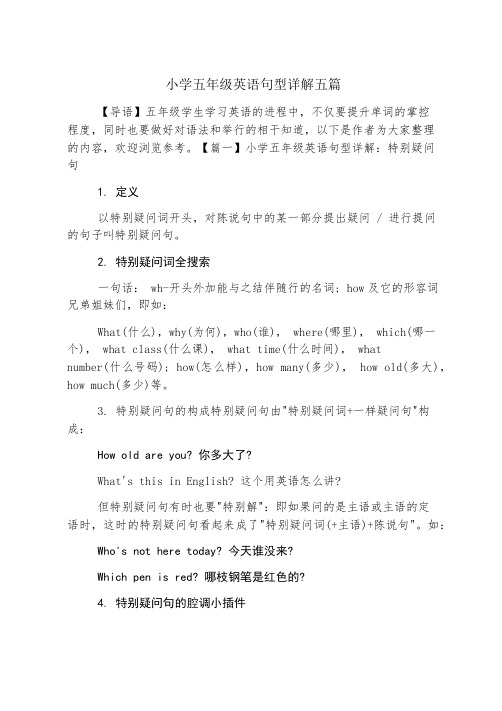
小学五年级英语句型详解五篇【导语】五年级学生学习英语的进程中,不仅要提升单词的掌控程度,同时也要做好对语法和举行的相干知道,以下是作者为大家整理的内容,欢迎浏览参考。
【篇一】小学五年级英语句型详解:特别疑问句1. 定义以特别疑问词开头,对陈说句中的某一部分提出疑问 / 进行提问的句子叫特别疑问句。
2. 特别疑问词全搜索一句话: wh-开头外加能与之结伴随行的名词; how及它的形容词兄弟姐妹们,即如:What(什么),why(为何),who(谁), where(哪里), which(哪一个), what class(什么课), what time(什么时间), whatnumber(什么号码); how(怎么样),how many(多少), how old(多大),how much(多少)等。
3. 特别疑问句的构成特别疑问句由"特别疑问词+一样疑问句"构成:How old are you? 你多大了?What's this in English? 这个用英语怎么讲?但特别疑问句有时也要"特别解":即如果问的是主语或主语的定语时,这时的特别疑问句看起来成了"特别疑问词(+主语)+陈说句"。
如:Who's not here today? 今天谁没来?Which pen is red? 哪枝钢笔是红色的?4. 特别疑问句的腔调小插件一样说来,特别疑问句都要读成降调(↘),并常常让最后一个单词承当此重任。
如:What row are you in(↘)? 你在第几排?Where is"E" (↘)? "E"在哪里?5. 对特别疑问句的答复小扫描回答特别疑问句,不能用"yes / no";但可用"到什么山上唱什么歌"来形容对特别疑问句的应对- -即问什么答什么(特别是简略回答更明显)。
小学英语常用句型及语法
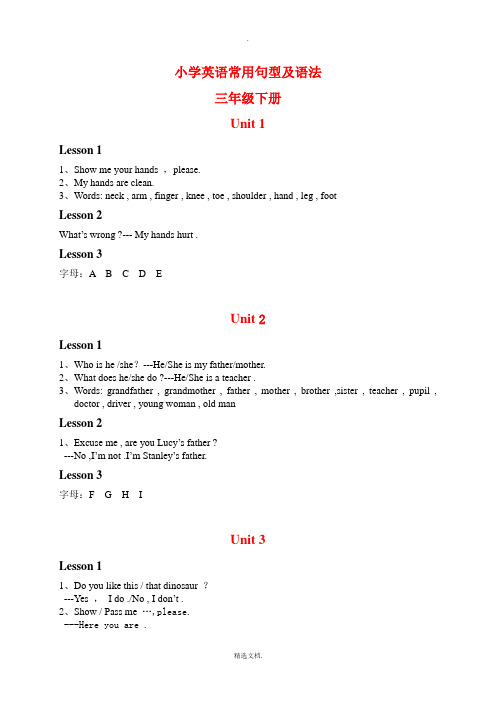
小学英语常用句型及语法三年级下册Unit 1Lesson 11、Show me your hands ,please.2、My hands are clean.3、Words: neck , arm , finger , knee , toe , shoulder , hand , leg , footLesson 2What’s wrong ?--- My hands hurt .Lesson 3字母:A B C D EUnit 2Lesson 11、Who is he /she?---He/She is my father/mother.2、What does he/she do ?---He/She is a teacher .3、Words: grandfather , grandmother , father , mother , brother ,sister , teacher , pupil ,doctor , driver , young woman , old manLesson 21、Excuse me , are you Lucy’s father ?---No ,I’m not .I’m Stanley’s father.Lesson 3字母:F G H IUnit 3Lesson 11、Do you like this / that dinosaur ?---Yes ,I do ./No , I don’t .2、Show / Pass me…,please.---Here you are .3、words : dinosaur , robot , boat , kite , car , train , plane , bus , uncle ,aunt , cousinLesson 21、How many …s do you have ?---I have three …s.2、May I play with this toy ?---Of course . Here you are.3、What toys do you like best ?---I like … best.Lesson 3字母:J K L MUnit 4Lesson 11、Do you like …s?---Yes , I do. / No, I don’t.2、Have an apple.---Yes,please./No,thank you.3、What can you see in Box 1?---I can see …4、words:apple , pear , orange ,banana , peach , cherry , watermelon, grape5、数字:11-15 (eleven , twelve ,thirteen , fourteen , fifteen )Lesson 21、What’s your favorite fruit?---I like … best .2、Can I help you ?---Yes, please./No,thank you.3、How many …s do you want?---数词,please.Lesson 3字母:N O P Q RUnit 5Lesson 11、Can you see ducks over there?---Yes,I/We can./ No,I/We can’t.2、Look at these/those….3、What’s this/that?---It’s a ….4、What are these/those?---They are …s.5、words:cow , horse , pig , hen , duck , tree , grass , flower , goose ,sheep , fishLesson 21、Welcome to …2、Let’s do like the animals.3、Sentences : (1)Jump like a rabbit. (2)Fly like a bird .(3)Walk like a duck . (4)Run like a dog.(5)Swim like a fish . (6)Sleep like a pig.Lesson 31、Do you have cats?---Yes , I/We do . / No, I/We don’t.2、How many cats do you have ?---Three.3、字母:S T U VUnit 6Lesson 11、Is this your coat?---Yes, it is. /No,it isn’t.2、Which is your coat ?---The yellow one .3、Whose coat is it ?---It’s Lily’s.4、Whose pants are they ?---They are Lucy’s.5、words: coat , shirt , T-shirt , dress , skirt , hat , scarf , sweater , pants ,shoes , socks , glovesLesson 21、Are they nice shoes ?---Yes, they are . /No, they aren’t.2、How are these shoes ?---They are just right .3、sentence:(1)Wash our clothes . (2)Hang our clothes .(3)Fold our clothes . (4)Put away our clothes .Lesson 31、How much are they ?---They are …yuan.2、字母:W X Y Z四年级上册Unit 1Lesson 11、How are you?---I’m fine/Ok/happy/sad…2、称赞用语及回答:How beautiful!---Thank you.3、Do you have a new pen ?---Yes , I do ./No, I don’t.4、Do you have new pens ? ---Yes , we do ./No ,we don’t.5、I have a new schoolbag.6、学科名词单词:Chinese ,math , music ,science , art , English , IT ,PE7、数词:16-20(sixteen , seventeen ,eighteen , nineteen ,twenty)8、How many books altogether ?---Seventeen books altogether.Lesson 21、复习句型:(1)How are you?(2)How many …s?2、新单词及词组:guess , try again , a/an的使用Lesson 3字母:A B C D EUnit 2Lesson 11、Do you know sb.?---Yes ,I do.He(She) is … /No,he(she) isn’t .2、Where is he/she from?---He/She is from…3、Where are you from?---I’m from…4、国家名称:Canada , UK , China , USA , Australia ,South Africa5、形容词:tall , short , thin ,fatLesson 21、What does he like?---He likes music.Lesson 3字母:F G H IUnit 3Lesson 11、What does a panda look like ?---It’s black and white.2、Can we see …?---Yes,we can./No,we can’t.3、动物单词:tiger , lion , elephant , hippo , giraffe , zebra , monkey , snake4、形容词:heavy , lovely , funny , strongLesson 21、Do you like monkeys?---Yes,I(We) do./No, I(We) don’t.2、Is it an elephant ?---Yes , it is ./No,it isn’t.3、I like …/I don’t like …4、短语:not at all , Why not?Lesson 3字母:J K L MUnit 41、What’s the matter?2、Is it in your bag?---Yes,it is./No, it isn’t.3、Where is the book?---It’s on the desk.4、words: door , window , wall , blackboard , desk , chair , TV , light , fan ,map , in ,on , underLesson 21、Who’s on duty today ?---Jim is on duty today.2、短语:clean up , turn off , get to work , put up the map , at once , closethe door , turn on , open ,afterLesson 3字母:N O P Q RUnit 5Lesson 11、I’m hungry . Are you hungry ?2、What’s for tea ?3、Have an apple pie .4、Words : cookie , candy , pie , ice cream , egg , bread , water , juice , milk ,tea , hungry , thirsty5、I like…6、Like sb. to do sth.Lesson 21、What do you like ? ---I like …2、May I have some …?---Sure .3、I’m hungry . /I’m thirsty .Lesson 3字母:S T U VUnit 61、Excuse me .2、May I have a seat ?---Sure ,this way ,please.3、Whose book is this ?---It’s Stanley’s.4、Where’s the sofa?---In the living room .5、Words: house , living room , bedroom , dining room , bathroom , study ,kitchen ,bed , table , sofaLesson 21、形容词:large , bright , clean , tidy2、短语:come in , take a seat , have some drinks3、句型:May I …?(have a seat , have some bread , read a book , wash my hands ,watch TV , have an ice cream)4、颜色:green , orange , black , red , brownLesson 31、字母:W X Y Z2、Let me make the bed.(Set the table, watch TV , read a book , have a shower ,have a rest)四年级下册Unit 1Lesson 11、Go to …(地点)quickly.2、What’s in the room?---There is a computer in the room .3、There is a picture on the wall .4、Is it for me ?5、Anything else ?6、Words: computer , lamp , clock , CD player , picture , umbrella , shelf ,end table , floor , beside , behindLesson 21、Welcome to …2、Is there a computer in your room?---Yes ,there is./No , there isn’t.3、介词:on,under , in ,beside, behindLesson 31、A的发音:长音和短音2、颜色:green , yellow , blue , purple , brown , red , orangeUnit 2Lesson 11、Come here.2、What’s my number ?---Your number is…3、Come on ,ready ,go!4、How many rabbits are there?---There are 5 five rabbits.5、数词:21 twenty-one,22 twenty-two,30 thirty,40 forty,50 fifty,60sixty6、Words: carrot ,tomato , potato , cabbage ,banana, watermelonLesson 21、Good job!2、This prize is for you.3、How kind of you.4、Let’s count.Lesson 3字母E的发音:bee tenUnit 3Lesson 11、Look at …2、What’s the time?---It’s 9 o’clock.3、May we have ten more minutes ?4、Good night!5、It’s time for bed .6、Words: breakfast , lunch , dinner , get up , go to school , go to bed , inthe morning , in the afternoon , in the evening ,at nightLesson 21、Is there a panda show in the morning ?---Yes, there is ./No,there isn,t .2、What time is the panda show ?---At 1:30.3、Let’s watch the panda show .4、时间的表示法Lesson 3字母I的发音:bike bigUnit 4Lesson 11、Can you play football?---Yes,I can./No,I can’t.2、Let me have a try .3、It’s easy to learn .4、Words: football , basketball , tennis , ping pong , cycling , swimming , hiking ,skiing , pass the ball , kick the ballLesson 21、Pass the ball to me .2、Don’t pass it to him .3、He can play football very well .4、短语:bounce the ball , roll the ball , kick the ball , dribble the ball ,pass the ball ,shoot the ballLesson 3字母O的发音:hole boxUnit 5Lesson 11、How’s the weather ?—It’s rainy.2、What about the afternoon ?---It’s cloudy in the afternoon.3、Can I go skating ?---Yes, you can ,/No, you can’t.4、Words : rainy , cloudy , snowy , sunny , windy , warm , hot , cool , cold ,wet , play tennis , go cycling , go skiingLesson 21、Who is it ?—It’s me.2、How nice to see you .3、词组:take off , put onLesson 3字母U的发音: music cupUnit 6Lesson 11、Where is the seal house ?---It’s in front of the shark house .2、Where are the penguins ?---They are between the two trees .3、Let’s look at the map first .4、Words: seal , shark , turtle , whale , dolphin , penguin , crab , sea lion ,toilet , in front of , betweenLesson 21、What’s your favorite sea animal?---My favorite sea animal is …2、Words : draw , cut , stick , behind , in front of ,betweenLesson 3字母A E I O U 的练习五年级上册Unit 1Lesson 11、May I help you?/ Can I help you ?---Yes, I want …,please.Lesson 21、What can I do for you?/ What do you want ?---I want …,please.2、How much are they?---They are … yuan .3、不可数名词的数量表示法:a pair of sunglasses, a bottle of yogurt , a bottleof coke , a bag of candies4、数词:70 seventy , 80 eighty , 90 ninety ,100 one hundred ,24 twenty-twoLesson 3B : bee , ball , book P : pea , pig , pinkD : deep , dolphin , doctor T : tea , teeth , today/i:/ :ee/ea(tea , teeth )Unit 2Lesson 11、What would you like for dinner?/What do you have for …?/What’s forbreakfast ?2、Words : vegetable , noodle , dumpling , chicken , rice , soupLesson 21、Do you have a …/…s ?---Yes,I/ We do ./No , I/We don’t .2、words : spoon , plate , cup , chopsticks , fork , bowl , glassLesson 3Phonics : /k/ , /g/ , /f/ , /v/ , /i/Unit 3Lesson 11、询问别人建议(1) How /What about … ?(2) How do you like … ?2、words : squirrel , parrot , goldfish , lizard , friendly , noisy , quiet ,clumsyLesson 21、What do they like to do ?---They like to do ….2、Words : eat , drink , fly , jump , sleep , swimLesson 3Phonics : /s/ , /z/ , /sh/ , /sure/ , /e/Unit 4Lesson 11、What day is it today ?--- It’s /Today is Monday .2、What do you have on Monday ?---I often have …3、Words : Monday , Tuesday , Wednesday , Thursday , Friday , Saturday , SundyLesson 21、Let’s do sth.2、What do you do on Mondays ?---I draw …3、Can you do … ?---Good idea!/Sorry , I have to…4、Words : draw , dance , sing , play with the piano , play chess , play badmintonLesson 31、Phonics : /l/ , /m/ , /n/ , /an/ , /a/2、When is the monkey show ?It’s on Monday .3、What time ?---At 8:20 am.Unit 5Lesson 11、Which class do you like best ?---I like … best .2、Words : listen , speak , draw , write , read , runLesson 21、It’s time for class .2、Do you like IT class ?—Yes , I do .It’s very interesting .3、Words : interesting , easy , relaxing , exciting , difficult , boringLesson 3Phonics : /u/ , /ar/五年级下册Unit 1Lesson 11、What are you doing ?—I’m doing …2、What is he/she doing?—He / She is doing …3、What’s the mother doing ?---She is doing …4、Words : answering the phone , watering the flower , washing the dishes ,cleaning the house , doing homework , watching TVLesson 21、How’s the weather ?—It’s rainy.2、What are they doing ?—They are doing …3、Are you v-ing ?---Yes ,I am ./No , I’m not .4、Are the monkeys v-ing ?---Yes ,they are ,/No , they aren’t .5、Is the girl v-ing ?---Yes ,she is ./No ,she isn’t.6、Words : drawing , studying , playing , skating , jumping , listeningLesson 3Phonics : /o/ , /h/ , /j/Unit 2Lesson 11、Why do you like spring best ?---Because I can do…in spring .2、It’s good time to do something .3、Words :spring , summer , autumn , winter , go for a picnic , go fishing ,go boating , go skiingLesson 21、复习下周进行时2、What can you see in the sky ?—There are some …s.3、Words : sky , woods , river , beach , parkLesson 3Phonics : /w/ , /r/ , /or/ , /all/ , /aw/Unit 3Lesson 11、Where is Li Tao ?—He is looking for insects over there .2、What do you like doing ?—I like v-ing in winter .3、Words : sleeping , walking , dancing , making , ladybug , butterfly , ant ,snailLesson 21、What does Andy like doing after school ?---He likes collecting stamps .2、Do you like doing sth.?—I have no idea .Is it any fun ?3、Words : collecting stamps , keeping pets , planting flowers , doing sportsLesson 3Phonics : /th/ ,/oo/Unit 4Lesson 11、What does your uncle do ?—He is a teacher .2、Words : teacher , engineer , policeman , nurse , cook , tennis player , pilotLesson 21、Do you know that man ?—Yes ,I do .He is a pilot.He is always busy .2、Words :busy , kind , helpful , patient , angry , happyLesson 3Phonics : /ch/ , /oo/ , /j/ , /ge/Unit 5Lesson 11、What are you going to do this weekend ?---We are going to visit a greenhouse tomorrow afternoon .2、May I go with you ?---Sure , it’s good to have you with us .3、How are you going to the zoo ?---I’m going there on foot .4、Are you going to visit your aunt by bus ?---Yes ,I am .5、Is he going to the beach on foot or by bike ?---By bike .6、Words : on foot , by boat , by bike , by train , by bus , by planeLesson 21、What are you going to buy ?---Some eggplants and onions .2、words : eggplant , onion , cucumber , chilli , pumpkin , beanLesson 3Phonics : /tr/ , /dr/ , /ts/ , /ds/ , /ur/ ,/er/ ,/ir/ ,/or/ ,/ar/六年级上册Unit 1Lesson 11、When is the school trip ?—It’s in October.2、Words : January , February ,March , April , May , June , July , August ,September , October ,November ,DecemberLesson 21、What’s the date,today ?—It’s January 1st.2、When is the Mother’s Day ?Lesson 3Phonics : /pl/ , /bl/ , /a-e/ , /ay/ , /ai/Unit 2Lesson 11、Where is the library ?---It’s on the second floor .2、Words :library , teacher’s office , canteen , swimming pool , gym , playgroundLesson 21、It’s time for class .2、Where are you going ?—I’m going to the art room .3、Where is the music room ?---It’s on the fifth floor .Lesson 3Phonics : /pr/ , /br/ , /i-e/ , /y/ , /igh/Unit 31、How does your sister go to the museum ?---Sometimes on foot , sometimes by taxi.2、How do you go …?---By …3、Words : taxi , light rail train , subway , ship , museum , bookstore ,supermarketLesson 21、What are they going to do ?---They are going to …2、Will you go shopping with me ?—Sure ./ Sorry .3、Let’s do sth.4、Words :take a walk , take a rest , take a picture , go shopping , go swimming ,go skatingLesson 3Phonics : /fl/ , /fr/ , /ou/ , /ow/Unit 4Lesson 11、Don’t pick fruit from the trees .2、What does this sign mean ?—It means …Lesson 2情态动词should 、must的用法1、We mustn’t fight with each other .2、We shouldn’t love each other .Lesson 3Phonics : /kl/ ,/gl/ , /oa/ , /ow/Unit 51、What’s your plan for this summer holiday ?---I’m going to take part in a race .2、words : take part in , take a trip , take training , nature park , Children’sPalace , go campingLesson 21、What can you do for these children ?—I/We can make them happy with our songs .2、Will you join the volunteer group ?—Yes, I will .3、Words : volunteer group , craft group , photography group , calligraphy groupLesson 3Phonics : /kr/ , /gr/ , /oy/ , /oi/六年级下册Unit 1Lesson 11、What would you like ?---A big glass of coke .2、Let’s get sth. To eat .—Good idea .I’d like …3、May I help you ?—Three pizzas ,please .4、Words : chips , fried chicken , hamburger , pizza , sandwich , sweetcorn ,coffeeLesson 21、How do you like pizza ?—It’s delicious .2、Words : delicious , sweet , sour , bitter , saltyLesson 3Phonics : /sp/ , /sk/ , /ear/ , /eer/Unit 2Lesson 11、Excuse me ,where is the bank ?---It’s next to the hospital .2、How can I get to your house ?---Walk along the road to the bank…3、Words : bank , hospital , cinema , bus stop , traffic lights , overpass ,crosswalk , underpassLesson 21、What can you see in the first picture ?—I can see …2、Can you show me the way to the bank ?—Sure , it’s next to …3、Words: through , along , across , up , downLesson 3Phonics : /sl/ , /sm/ , /air/ , /ear/ , /are/Unit 3Lesson 11、Can you draw rain ?—Yes ,I can .It’s easy .2、Where does rain come from ?—It comes from …3、Words :rain , cloud , snow , lake , sea , mountainLesson 21、Turn on the computer .2、What can you see ?—I can see the earth.3、Words :earth , sun , moon , star , rainbowLesson 3Phonics : /sn/ , /st/ , /our/ , /ure/Unit 4Lesson 11、Are you ready for the trip ?---Yes ,I am ./No,I’m not .2、Don’t forget to take the towel .3、Words : towel , toothbrush , toothpaste , soap , camera , battery , flashlight ,raincoatLesson 21、What shall I take for this trip ?—You should take a cap with you .2、Words :cap , jacket , jeans , sandals , bootsLesson 3Phonics : /sw/ , /tw/ , /kw/ , /ind/Unit 5Lesson 11、Would you like to be a driver ?---No, I’d like to be a cook .Because …2、words : sportsman , scientist , astronant , artist , musician , dancer ,writer ,vetLesson 2Tell me about your …Lesson 3Phonics : /spr/ , /str/ , /n/ , /old/。
小学英语四种基本句型肯定句否定句一般疑问句与特殊疑问句

肯定句变否认句:在 am, is, are 后面加上 not,其余按顺序照抄。 肯定句变一般疑问句:把 am, is, are 提前放到句首并大写 Am, Is, Are,其余照抄。 肯定句变特殊疑问句〔就划线局部提问〕:分 3 步骤 第一步:先变一般疑问句 第二步:找适宜的特殊疑问词代替划线局部〔划线局部不能在特殊疑问句中出现〕 第三步:特殊疑问词提前放到句首,并大写,其余按顺序照抄,省略划线局部。
练一练 1 (用特殊疑问词填空):
1、A: _______ is the boy in blue B:He’s Mike.
2、A: _______ wallet is it
B:It’s mine.
3、A: _______ is the diary
B:It’s under the chair.
4、A: _______ is the Chirstmas Day B: It’s on the 25th of December.
4、 This picture is very beautiful. 〔改为以 what 引导的感慨句〕
5、 Kick the ball to me! (改为否认句)
6、 I have a big present. 〔对划线局部提问〕
7、 There are some orange trees on the farm. (改为单数句子)
类别 陈述句
疑问句
用法
标点
肯定 表达一件事情或 说明说话人的看法 .
否认
一般 用于提出问题
特殊 用于提出问题
例句 This is a bag. That's my book. I can see a bag over there. I don't know. Are you a student Do you like puppets Can you speak English What's your name Where's my bag How many trees are there
小学英语四种基本句型-肯定句、否定句、一般疑问句及特殊疑问句
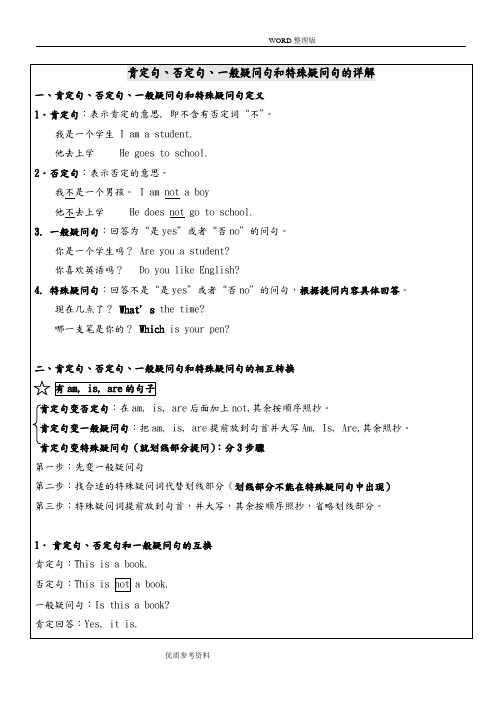
1.肯定句、否定句和一般疑问句的互换 非单三时用 do, 单三时用 does 非单三 肯定句:I like English.
一般疑问句:Do you like English? 否定句:I do not like English. 单三 肯定句:He likes English. 一般疑问句:Does he like English? 否定句:He does not like English.
why 为什么 问原因
how much 多少 问价钱
what 什么 问东西
how about …怎么样 问意见
what time 什么时间 问时间 how far 多远 问路程 what colour 什么颜色 问颜色 how long 多长 问时间
what about…怎么样 问意见 How soon 多快,多久 问时间
2.就划线部分提问(变特殊疑问句) I like English. 第一步:先变一般疑问句 Do you like English? 第二步:找合适的特殊疑问词代替划线部分 Do you like what? 第三步:特殊疑问词提前放到句首,并大写,其余按顺序照抄,省略划线部分。
优质参考资料
What do you like? 常用特殊疑问词及词组:
2、A: _______ wallet is it?
B:ห้องสมุดไป่ตู้t’s mine.
3、A: _______ is the diary?
B:It’s under the chair.
4、A: _______ is the Chirstmas Day?
B: It’s on the 25th of December.
14、A:_______ do you have dinner? B: At 6 o’clock
小学英语四种基本句型-肯定句、否定句、一般疑问句及特殊疑问句
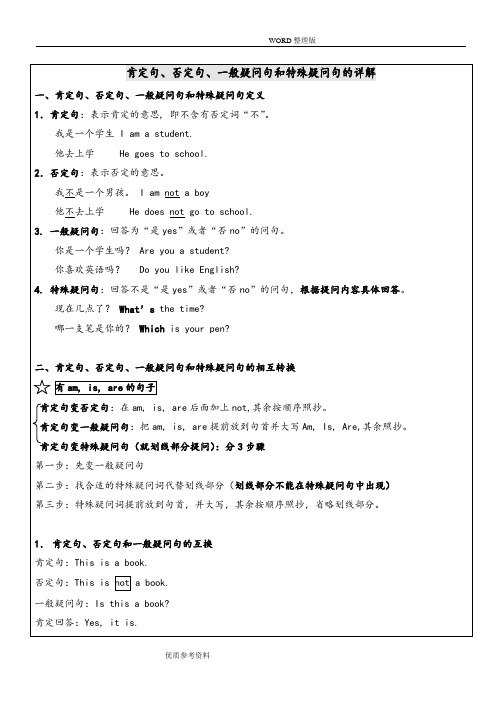
WORD 整理版
常用特殊疑问词及词组:
when 什么时间(问时间)
what date 什么日期 问具体日期
who 谁(问人)
what place 什么地点问具体地址
whose 谁的 问主人
how …怎么样 问情况
where 在哪里 问地点
how old 多大 问年龄
which 哪一个 问选择
how many 多少 问数量
I have been there already.→I haven't been there yet.
熟记变特殊疑问句时,容易判断错的情况。 1、 数词
表示年龄:He is fifty-five. How old is he ? 表示时间:It’s fifty-five. What’s the time? 表示加法:Six and two is eight. What’s six and two? 表示价格:The shirt is thirty yuan . How much is the shirt? 表示多少:I have three brothers. How many brothers do you have? 2、 姓名和人 表示人名:My name is Gina. What’s your name? 表示人:The woman is Gina. Who is the woman ? 3、 长度和距离 表示距离:It’s five hundred metres away from here. How far is it from here? 表示长度:It’s five hundred metres. How long is it ?
B: _______ ?
A: I want to make a kite.
小学英语五种简单句基本句型附例句

小学英语知识点——五种简单句基本句型·例句句式1:主语+ 谓语(即“主谓”句型)[例句] They arrived. 他们到了。
[分析]主语+谓语=they+arrived句式2:主语+谓语+宾语(即“主谓宾”句型)[例句]I played football last Friday. 上周五我踢球来着。
[分析]主语+谓语+宾语=I+played+football句式3:主语+谓语+间接宾语+直接宾语(即“主谓双宾”句型)[例句] The teacher taught us English. 这位老师教过我们英语。
[分析]主语+谓语+间接宾语+直接宾语=the teacher+taught+us+English句式4:主语+谓语+宾语+宾语补足语(即“主谓宾宾补”句型)[例句]He asked her to go there. 他让她去那里。
[分析]主语+谓语+宾语+宾语补足语=he+asked+her+to go there句式5:主语+系动词+表语(即“主系表”句型)[例句]I am a teacher. 我是一位老师。
[分析]主语+系动词+表语=I+am(be)+a teacher(表明主语身份)小学英语知识点——五种简单句基本句型·例句句式1:主语+ 谓语(即“主谓”句型)[例句] They arrived. 他们到了。
[分析]主语+谓语=they+arrived句式2:主语+谓语+宾语(即“主谓宾”句型)[例句]I played football last Friday.上周五我踢球来着。
[分析]主语+谓语+宾语=I+played+football句式3:主语+谓语+间接宾语+直接宾语(即“主谓双宾”句型)[例句] The teacher taught us English. 这位老师教过我们英语。
[分析]主语+谓语+间接宾语+直接宾语=the teacher+taught+us+English句式4:主语+谓语+宾语+宾语补足语(即“主谓宾宾补”句型)[例句]He asked her to go there.他让她去那里。
(完整版)小学英语五种基本句型

五种基本句型分析解读英语中的五种基本句型,它是英语句子的基础。
因为英语中各种复杂的句子均是由这五种基本句型扩大、组合、省略或倒装等各种形式变化而来的。
从英语句子的本质来看,有其内在的规律。
I am a studentI like playing football.Playing footall is interesting.Playing footall.t brings me a lot of fun.We can call Internet addicts a Webaholic.Internet dating hurts.由此我们可以总结:一个完整的英语句子都由两部分组成“陈述对象+陈述内容”=“主语+谓语”=“名词+动词”。
1、主语+系动词+表语这个句型的谓语动词是系动词(linking verb)。
所谓系动词,顾名思义,这种动词并不表示具体的动作,而只是起连接主语和后面成分的作用。
系动词后面所接的成分,是用来说明主语的特点,表明主语的性质特征的,所以我们称之为表语(能够表示主语特征的成分)。
The music sounds nice. He became a teacher. The leaf will turn yellow in autumn.英语中最常见的系动词是be动词,其具体形式有:am(I am), is(he is,she is, it is), are(we are, you are, they are).其他的系动词还有:look, sound, smell, taste, fell, seem, appear, become, turn.用作表语的词,通常是名词(如a Webahoblic, a teacher...)和形容词(如interesting,nice, yellow...)。
2、句型二:主语+谓语 .这个句型的谓语动词要是不及物动词(intransitive verb)。
- 1、下载文档前请自行甄别文档内容的完整性,平台不提供额外的编辑、内容补充、找答案等附加服务。
- 2、"仅部分预览"的文档,不可在线预览部分如存在完整性等问题,可反馈申请退款(可完整预览的文档不适用该条件!)。
- 3、如文档侵犯您的权益,请联系客服反馈,我们会尽快为您处理(人工客服工作时间:9:00-18:30)。
五种基本句型
分析解读英语中的五种基本句型,它是英语句子的基础。
因为英语中各种复杂的句子均是由这五种基本句型扩大、组合、省略或倒装等各种形式变化而来的。
从英语句子的本质来看,有其内在的规律。
I am a student
I like playing football.
Playing footall is interesting.
Playing footall.t brings me a lot of fun.
We can call Internet addicts a Webaholic.
Internet dating hurts.由此我们可以总结:
一个完整的英语句子都由两部分组成“陈述对象+陈述内容”=“主语+谓语”=“名词+动词”。
1、主语+系动词+表语
这个句型的谓语动词是系动词(linking verb)。
所谓系动词,顾名思义,这种动词并不表示具体的动作,而只是起连接主语和后面成分的作
用。
系动词后面所接的成分,是用来说明主语的特点,表明主语的性质特征的,所以我们称之为表语(能够表示主语特征的成分)。
The music sounds nice. He became a teacher. The leaf will turn yellow in autumn.
英语中最常见的系动词是be动词,其具体形式有:am(I am), is(he is, she is, it is), are(we are, you are, they are).其他的系动词还有:look, sound, smell, taste, fell, seem, appear, become, turn.
用作表语的词,通常是名词(如a Webahoblic, a teacher...)和形容词(如interesting,nice, yellow...)。
2、句型二:主语+谓语 .
这个句型的谓语动词要是不及物动词(intransitive verb)。
所谓不及物动词,所表示的动作没有作用对象,其本身的意思完整,后面不需要带宾语。
The fire is burning. The sun rises and the sun sets.
The sun sets in the west. He works hard.
此内句型中的谓语动词后面虽然不接宾语,但通常会接副词(如hard)或介词短语(如in the west),来说明动作的方式、地点或时间等等。
英语中把这种修饰动作的成分称之为状语。
They shouted loudly. 这里的副词表示动作的方式,所以叫做方式状语。
He died at home. 这里的介词短语表示动作的地点,所以叫做地点状语。
He died in 2007. 这里的介词短语表示动作的时间,所以叫做时间状语。
(主语+谓语(不及物动词)+状语)
3、I like chatting online. 句型三:主语+谓语+宾语
这个句型的谓语动词要是及物动词(transitive verb)。
所谓及物动词,这种动词告诉我们由主语发出的动作所作用的对象是什么,这里所作用的对象称之为宾语。
即宾语是主语动作的承受对象。
I like chatting on the Internet. chatting作宾语,介词短语on the Internet修饰动作,作状语。
He speaks English well. English作宾语,副词well修饰动作speak,作状语。
(主语+谓语(及物动词)+宾语+状语)
4、Chatting on the Internet brings me a lot of fun. 句型四:主语+谓语+间接宾语+直接宾语
这个句型的谓语动词要是双宾动词(dative verb)。
这种动词后面所接的成分有“人”又有“物”。
“人”表示动作的接受者,称之为间接宾语(indirect object)。
“物”表示动作作用的对象,是动作的承受者,称之为直接宾语(direct object)。
间接宾语和直接宾语合起来叫做双宾语。
He showed the guard his passport. the guard人表“间接宾语”,his passport物表“直接宾语”。
5、You can leave the door open。
句型五:主语+谓语+宾语+宾语补足语
这个句型的谓语动词是宾补动词(factitive verb)。
这种动词的后面接宾语,而此宾语的后面又接补充说明宾语的补足语(object complement)。
宾语和宾语补足语合起来叫做复合宾语。
I found this answer wrong. this answer是宾语,wrong作宾语补足语,说明前面的宾语。
You can leave the door open. the door是宾语,open作宾语补足语,说明前面的宾语。
总上所知,动词是构成一个句子的骨架结构。
因为由动词来决定了一个句子是否有宾语,有几个宾语,以及其他句子成分。
所以在学习英语单词时,要特别关注动词的用法特点。
如果把英语句子比作一个“人”的话,“主语”就是我们的“大脑”,“谓语动词”就是我们的“心脏”,缺一不可,支配着“身体”其他各部分的运动和发展。
可以说,动词是英语的灵魂!
判断下面句子为哪一种句型
1. My parents live in the country。
2. Lily followed her there
3. They saw Lily swimming towards the bank.
4. There you’ll see a lake
5. Jim brought me my English book。
6. Kate called her cat Mimi.
7. You try to get the other person down on the floor.
8. We gave the presents to Grandma.
9. In my spare time I enjoy listening to pop music.
10. Education is free for all the children.
11. The fish smells terrible.
12. Mum told us not to play with fire.
13. He has had his watch repaired.
14. He continued his study at a university.
15. We can’t afford to buy a tractor.
16. A new dress costs over 400 francs.
17 We will have lunch at the place of visit.
18. We will set out after breakfast at eight.
19. I have heard some people say “He is taller than me” instead of “He is taller than I”.
20. My mother made my sister a new skirt. 中考语文专项练习—
—散文阅读附参考答案
(一)
零度绽放
①娇艳美丽的玫瑰,清新淡雅的百合,芬芳宜人的莲花……,似乎太多的花儿都是开放在温暖的春夏。
特别是那些野外的花,经霜耐寒凌风而开的,除了寥寥的几种,人们也不会想到更多。
一如生活中,在最艰难的境遇里,能绽放出最美的笑容的,都是那些坚强的人。
②而在这个极北极远的山区城市,一年中有七个月的寒冷天气,那肃杀的冰封雪盖,似乎已将一切美好冻结。
曾问过一个远方的朋友,在零度的天气里,会有什么花儿开放。
她想了想,告诉我,是雪花!的确,在我们这里,有时九月末就开始飘雪,那时夜里的气温,就是在零度左右。
在她的印象中,那样的环境里,只能有雪花盛开,虽美丽,却寒冷。
一种没有温度的绽放,只能点染眼睛,却无法温暖心绪。
③只有那真正有韵味的绽放,才是真正能勾人心魄,摄其心魂的。
④我有个朋友,也许你一眼看不出她的能量,只是小小可爱,平淡无奇。
可她却总是有种让人敬佩的韧劲富含其中,觉得她是那样一个美丽有内涵的女子。
让人在众多娇艳美丽的玫瑰中,才觉得她是最美丽的那株。
因为她的心,她的气质使她周身都散发着光芒,那无穷无尽的力量把人深深地吸引住,让人不觉赞叹不止。
要把自己的内心充实起来,也许你一时只是一颗花苞,不能像其他花朵一样为人称赞,可你慢慢的积累天地之精华,慢慢等待,终有一天,你的绽放,会夺得所有人的目光,会是百花丛中最艳丽的一朵,香飘十里,让人难舍难忘。
⑤在小兴安岭,每年的深秋,在寒冷初临的时候,入目的便是缤纷的五花山。
远远望去,山披彩衣,红枫青松,黄杨白桦,还有各种成熟的野果,就如在山上开了大朵大朵的花,而且愈冷颜色愈是清艳。
这是比雪花更早开的五花山,直到第一场雪到来,山岭才渐渐素淡起来。
⑥。
